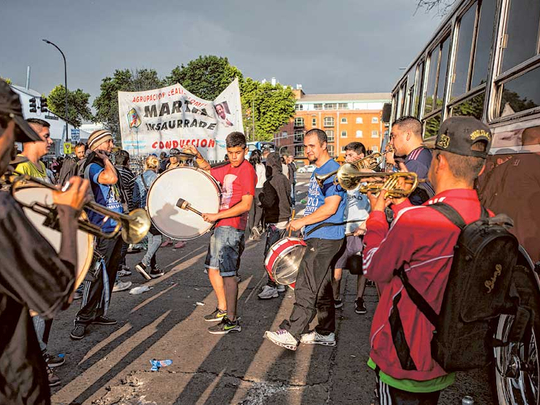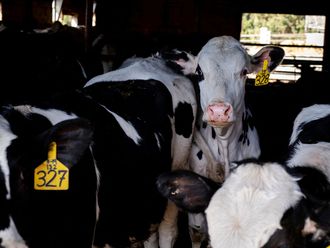
BUENOS AIRES - Argentina, whose politics can be indistinguishable from fantasy, has been on a particular streak of make-believe lately. Electricity costs most households about $2 a month, the highest-denominated bill is worth less than $10 and its president holds a nationwide broadcast to announce a bond payment that would be a mundane, unnoticed event anywhere else.
With the country preparing for presidential elections on Sunday, all of that seems likely to end. Voters will choose from a roster of candidates seeking to bring South America’s second biggest economy back from more than a decade of financial and political isolation.
“Regardless of who wins, we’re going to see a moderate move to the centre and a more consensus-seeking, institutional politics,” said Steven Levitsky, a political scientist at Harvard University.
The election may also lay down a marker for the rest of the region. The rule of left-leaning populists across South America during the commodities boom appears to be heading to an end as prices of oil, soy and copper have plummeted. The opposition may win congressional elections in December in Venezuela; Brazil’s president is threatened with impeachment.
In Argentina, Sunday’s election will bring an end to a dozen years of populism by President Cristina Fernandez de Kirchner and her late husband Nestor. They sparred with the International Monetary Fund, led the country into its second default this century rather than pay hedge funds, and bought loyalty through subsidies and spending that’s driven the hemisphere’s second-highest inflation rate.
While the race has nominally been a contest between the ruling party’s candidate, Daniel Scioli, the front runner, who promises continuity versus opposition rivals Mauricio Macri and Sergio Massa pledging change, in reality any of the three will mark a shift away from the Kirchner era. As voting day has approached, all have invoked her populism to win votes but none are expected to continue it.
The differences among the three are over pace and intensity, not ideology. Scioli, the governor of Buenos Aires province, promises to maintain some current policies while making gradual changes. They include ending the decade-long legal fight over the 2001 default that has kept the country locked out of foreign debt markets, taming inflation of 25 per cent, cutting a budget deficit of 7 per cent of gross domestic product and bringing in dollars to replenish depleted hard currency reserves. The economy is limping along, growing less than 1 per cent a year.
Macri and Massa plan to move more quickly, dismantling currency controls and removing agricultural export tariffs. The direction of all three economic policies is the same — towards the centre, said Daniel Kerner, the head of Latin America research at Eurasia Group in Washington.
The gap between the official exchange rate and the price demanded on the street widened to 69 per cent Friday. The black market peso weakened 0.1 per cent to 16.05 pesos per dollar compared to 9.52 pesos per dollar.
Scioli leads all polls. But it is unclear whether he can win in a first round. Argentina’s complex system requires either a margin of 45 per cent or 40 per cent with a 10 per centage point difference over the number two to avoid a run-off on Nov. 22.
A Management & Fit survey published October 17 gave Scioli 38.3 per cent against 29.2 per cent for Macri and 21 per cent for Massa after projecting undecided votes. A poll by Ipsos Mora y Araujo published in Perfil found Scioli would get 42 per cent against 28 per cent for Macri and 23 per cent for Massa.
The election could also signal an end to a belligerent and polarizing form of politics practiced by the Kirchners. They have fought not only with New York hedge funds and the IMF but also with farmers over tax increases and the middle-class over access to dollars. When private economists began publishing their own inflation data following widely criticized methodology changes at the statistics institute, Fernandez slapped them with fines and threatened to imprison them. The couple’s long-time economic aide Guillermo Moreno earned a reputation as a bully for his strong-arm tactics enforcing price controls. He welcomed the reputation and once showed up to a company’s shareholder meeting with boxing gloves on.
Whoever takes over the presidential Pink House on Dec. 11 will find himself in a far weaker position than Fernandez was when she succeeded her husband in 2007. Prices for soy, the country’s top export, have halved in the past two years to $9 a bushel. Moreover, the next president will likely not have an absolute majority in Congress, obliging him to negotiate.
“Argentina’s been on a distinct trajectory for the past dozen years,” said Mark P. Jones, a professor of political science at Rice University’s Baker Institute in Houston. “We’ve seen a far more combative position vis-a-vis global financial institutions and the utilization of rhetoric that’s more nationalistic and populist and extreme than will be the case with Scioli, Macri or Massa.”
Scioli says he will talk with the opposition before filling two seats on the Supreme Court and allow his opponents to occupy key positions in bodies that act as checks on government power. Macri has spoken of seeking to change the political culture by respecting the independence of the country’s institutions.
Not everyone is convinced that the elections will mark a big change or that Kirchnerism will really end. Fernandez is the first president since Argentina’s return to democracy in 1983 to leave office with approval ratings as high as 50 per cent and without a full-blown economic crisis. If Macri prevails, Fernandez will be the de facto leader of the opposition and well-positioned for a return in 2019, Kerner said.
If Scioli wins, his risk-averse approach may end up producing less adjustment than some are expecting, said Rice University’s Jones. How the next president handles the unpopular changes that need to be made could determine whether Fernandez is able to make a comeback.












